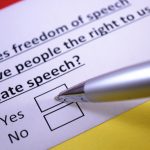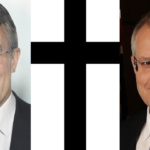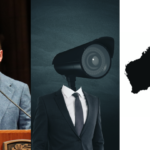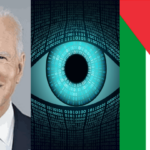When It Comes to Kneejerk Criminal Law Enactment, Antisemitism Is the New Terrorism

Following the 2001 9/11 attacks in New York City, the Australian government, like many others, embarked on a terror law enacting bonanza. And because our nation, unlike any other western democracies, is devoid of federal rights protections, our terror laws have significantly longer reach.
Two decades later and the counterterrorism-national security legislating frenzy continues, with around 100 bills having now been passed. And as rights advocates have long warned would occur these laws are now being applied to Australian citizens.
The bipartisan terror law drafting agenda has also resulted in the Australian government forging a political climate that’s increasingly secretive, lacking in accountability and corrupt.
Yet, there’s a new pretext on the Australian scene now serving to provide fresh reason for legislating tougher criminal laws, and that’s antisemitism.
And in terms of how this is playing out, a rise in pro-Palestinian support is being framed in the public sphere as antisemitic, with NSW having strengthened hate speech laws in response to false claims, while, federally, the Albanese government is expediting doxxing laws in a move critiqued as biased.
However, antisemitism, the new pretext serving to justify more criminal laws, is not likely to have the shelf life of terrorism, as weaponisng it in order to block criticism of Israeli atrocity crimes is fast undermining it’s purpose of identifying anti-Jewish hate and naming it in order to stamp it out.
A Zionist list
“What they have in common, though, is the fact that they’re members of the Jewish community,” PM Anthony Albanese said on 2GB Radio, regarding the public release of the Z600 list, which included the names and details of Zionist creatives and academics making up a WhatsApp group.
The Zionist intellectuals on the list had come under scrutiny after being exposed as secretly lobbying ABC management to sack Lebanese Australian journalist Antoinette Lattouf, during a one-week stint at the public broadcaster, as she’d been a vocal critic of the genocide in Gaza prior to taking the job.
To be clear, antisemitism is prejudice towards Jewish people, whilst anti-Zionism involves the rejection of the Zionist project, which seeks to establish a Jewish state in the Middle East predicated upon the end of historic Palestine. And many Zionists are actually Christians.
During the 12 February 2GB Drive program, the prime minister added, that “the idea that in Australia, someone should be targeted because of their religion, because of their faith, whether they be Jewish or Muslim or Hindu or Catholic or Buddhist, is just completely unacceptable”.
But in stark contrast to this assertion, the pro-Palestinian advocates who released the names did so because these individuals were clandestinely persecuting a Lebanese journalist for criticising the Israeli-perpetrated mass killing in Gaza, which had nothing to do with their religion.
Indeed, framing the release of the names as an antisemitic act, or a Jewish hate crime, by the PM is dishonest.
And as Albanese told 2GB host Chris O’Keefe, he now has the attorney general hurriedly drafting anti-doxxing laws to prevent such public exposures from happening again.
The overwhelming bias in this move by federal Labor is that its only acting to criminalise doxxing after the Zionist creatives exposure, when Palestinian healthcare workers and their supporters have repeatedly called for assistance over the same behaviour as the Gaza atrocities continue, to no avail.
Exposure online
As Albanese defines it, doxxing is the “malicious publication of private information online”. And as with the revelations regarding the Zionist creatives and academics, the act of doxxing, or document dropping, serves as punishment or retribution for something the person exposed has done.
The reason doxxing is problematic is it opens up those who’ve had their personal details posted online to potential further harms caused by others hostile to the behaviour the doxxed individual is allegedly guilty of. Such harms can include job loss, violence and harassment.
These laws are further unnecessary as the act of doxxing is likely captured under section 474.17 of the Criminal Code Act 1995 (Cth), which contains the crime of using a carriage service to menace, harass or cause offence. And this crime can see an individual liable to up to 5 years imprisonment.
On the day after Albanese was on 2GB, attorney general Mark Dreyfus held a press conference, outlining that he was planning to act on doxxing as part of a coming overhaul of the Privacy Act 1988 (Cth), but on the PM’s request, he’s now going to move on the new laws immediately.
The nation’s chief lawmaker outlined that the laws have not be drafted as yet. But he had been running some ideas by the eSafety Commissioner, which would involve online platforms being able to remove such posts, along with the sending of take down notices and the imposition of penalties.
“The recent targeting of members of the Australian Jewish community through those practices like doxxing was shocking, but sadly, this is far from being an isolated incident,” added the AG, as he again framed the recent exposure of the Zionist intellectuals as a form of antisemitism.
And Dreyfus further added that he’d also be looking at “provisions that strengthen current laws that deal with hate speech”.
Preventing nonexistent hate
Strengthening hate speech laws is exactly what the NSW Minns government did right before the Christmas break. And the changes were made in the wake of allegations that antisemitic chants were made by a small element at a pro-Palestinian rally before the Sydney Opera House on 9 October.
As is not generally the case at pro-Palestinian rallies, some people called out “fuck the Jews” during the event designed to counter the projecting of the Israeli flag onto the Opera House in the wake of the 7 October Hamas attacks on Israel.
And on the morning after the protest, the Australian Jewish Association began distributing footage that had protesters calling out “gas the Jews”. But this was widely disputed, as Labor MLC Stephen Lawrence outlined in parliament that “real questions” had emerged about the legitimacy of the clips.
Lawrence made his remarks on 30 November, when the NSW upper house was debating the Crimes Amendment (Prosecution of Certain Offences) Bill 2023, which contained changes to hate speech laws in response to the Opera House allegations, and it was passed soon after the MLC spoke.
Section 93Z of the Crimes Act 1900 (NSW) contains the offence of publicly threatening or inciting violence on grounds of race, religion, sex, gender or intersex or HIV/AIDS status, which carries up to 3 years prison and/or a fine of $11,000 for individuals, while corporations can cop a $55,000 fine.
Prior to the change, subsection 93Z(4) had required that “a prosecution for an offence against this section is not to be commenced without the approval of the Director of Public Prosecutions”. The change resulted in the addition of a police officer, so they, along with the DPP, can greenlight a case.
The reason NSW premier Chris Minns gave for lowering the bar for such prosecutions is that since the law was enacted in 2018, no convictions have been made, and instead of considering the offence as acting as a preventative measure, he considers that it’s simply not working.
The premier was charged with kneejerk lawmaking as he moved to amend the hate speech law, and in a development that underscores his critics were right, an independent forensic analyst told NSW police this month that it’s conclusive that no one chanted “gas the Jews” at the Opera House.
This is further significant as “gas the Jews” would likely breach the threshold of the 93Z hate speech law, while “fuck the Jews” would not.
Gaslighting a nation
The ongoing passing of terrorism laws has accompanied a general authoritarian creep in this nation over the past two decades, and the turn towards passing criminal laws to combat antisemitism is simply another form of this legislating to shore up further government control.
As civil liberties advocates always warn, the danger of having so many far-reaching criminal laws on the books is not that they will be used by the current administration, but if a tyrannical government is voted into power, then they’re likely to oppressively apply them.
Yet, these warnings might have come too late, as the people of Australia are now finding their leaders quite willing to watch as a genocide unfolds before their eyes, and further than that, these politicians are seeking to frame the genocide in such as manner as to insist it doesn’t even exist.







